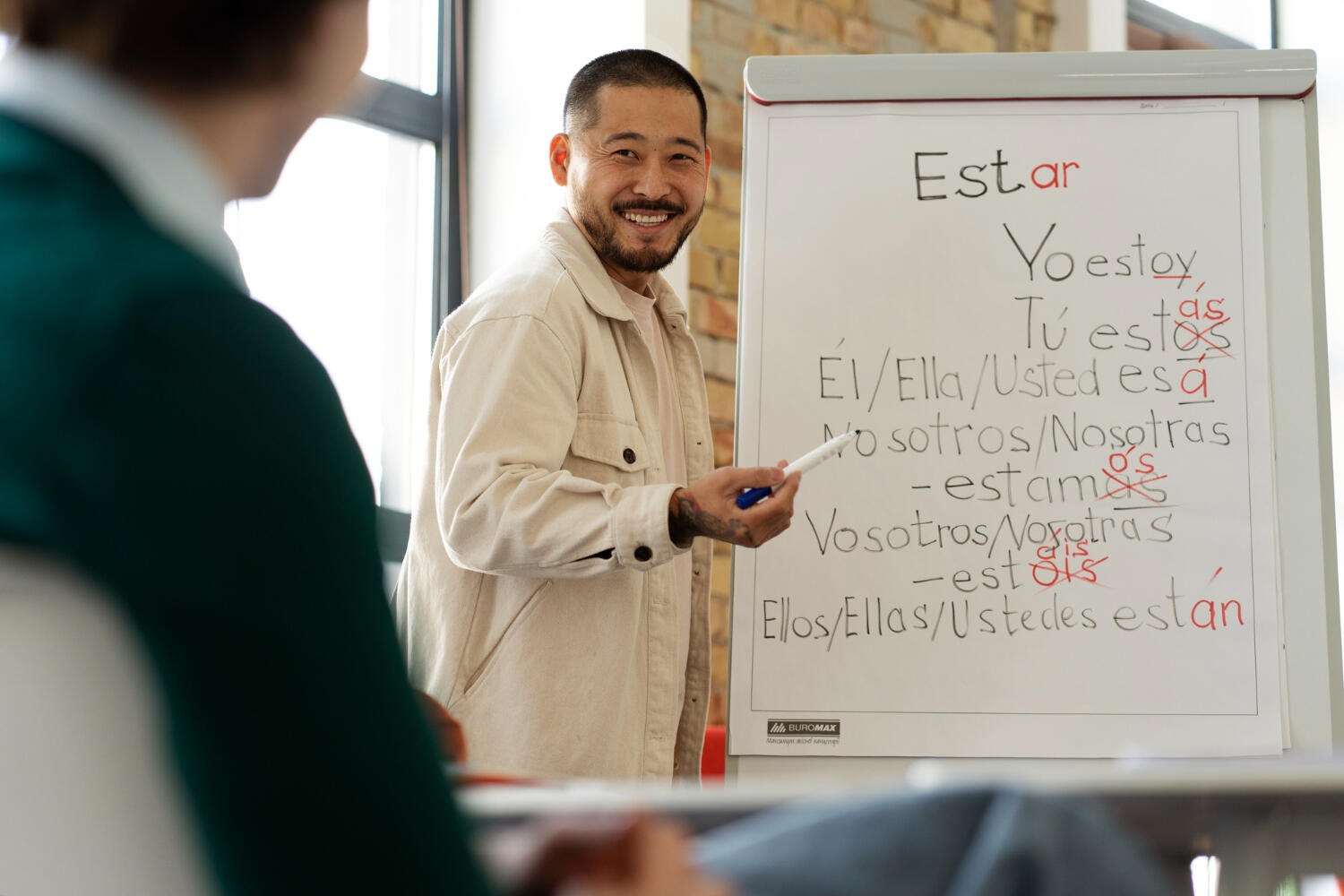Whether you're in the process of acquiring your Bachelor's or Master's degree in teaching Spanish, thinking about pursuing education in teaching Spanish, or just want to help others learn a language you're passionate about, there's a way you can sharpen your pedagogy skills without a certification! Find out how you can begin teaching Spanish to students without completing certain teaching criteria. This option is great for future teachers and people who want to help others learn.
Want to give private lessons?
Join the Superprof community and share your knowledge with interested and motivated students.
Teach Spanish as a Substitute Teacher
This route is especially apt for those who have begun their teaching studies but haven't completed the course or passed the licensure examinations yet.
Even if you aren’t a fully qualified teacher, you’ll still be able to work in the public school system and gain some teaching experience as a substitute teacher. You can even still teach Spanish this way.
Substitute teaching requirements vary according to the school system as well, but in many public school systems, you just need a minimum of an Associate’s Degree or two years of a Bachelor's degree to substitute teach.
To be a Spanish teacher, you will typically need to have a Bachelor's or Master's degree in Teaching or a related field, plus the proper certification and licensure. However, you can become a substitute Spanish teacher, a private Spanish teacher, or a Spanish tutor with fewer hurdles.
Some school systems might have certified teachers as their primary substitute teachers, and a roster of additional non-certified substitute teachers to fill any gaps. It all depends on the system in your town or school district, so it’s worth going to your local superintendent’s office to speak to them and find out how to register.
Also note that some states require substitute teachers to get permits or licenses, but these credentials are easier to obtain than a full teaching license.
Discover online teaching resources to develop your lesson plans and teaching methods so you can become a top-notch teacher.

Different Types of Substitute Teaching
Substitute teaching doesn't have a universal contract type. There may be differences in how substitutes are hired and compensated depending on the state, school district, or other factors.
There are generally two kinds of substitute teachers:
Daily Substitutes (Per Diem)
Daily subs are usually paid on a daily basis. They aren't qualified teachers and can cover any subject, for any grade. They’re often called up to cover for teachers in case of last-minute sickness or personal emergencies, and will often be left a lesson plan to follow.
Long-Term Substitutes
A permanent or long-term substitute teacher is sometimes a qualified teacher, but still sometimes not. These teachers are hired to replace a specific person for a specific subject and absence, often to provide coverage during parental leave or to cover for a long-term sickness or injury. This type of gig is usually only given when the school has exhausted other options for finding a qualified teacher as a replacement.
To apply for substitute teaching jobs, and maybe even jobs as a permanent sub for Spanish, you’ll need to register with your local superintendent's office. Often, they’ll have an online system that you'll need to check daily for opportunities, so you’ll need to check in regularly every morning to find a post. Although it’s helpful to have a Bachelor's in Spanish and/or Education, it’s certainly not required, and most subs aren't fully licensed teachers.
One child, one teacher, one book, one pen can change the world.
Malala Yousafzai
Pros and Cons of Substitute Teaching
Substitute teaching is a unique situation. Its flexibility is both an advantage and a disadvantage. Here are the top things to keep in mind when deciding to pursue substitute teaching.
Many people who are interested in teaching first try out the profession this way to get a bit of classroom experience. If you can find a job as a permanent sub for a high school Spanish teacher, you’ll be able to develop a good understanding of whether or not it’s the right career for you.
If you then want to continue teaching Spanish as a full-time teacher after the end of your contract, you’ll need to complete your education and take the Teacher Certification Exam.
If you decide teaching isn't for you, you've saved a few years and a lot of money by not pursuing a degree in education.
Substitute teaching can be a very precarious job. Often, you’re only ever guaranteed one day of work at a time. You also won’t receive any benefits, even if you end up subbing every day, so you need to be prepared to cover your own health care costs and save for retirement, and you might need another flexible job to cover the days when you don't get any shifts.
Rates are often depressingly close to minimum wage.
You might not be able to develop a connection with your students, which many teachers want.
You might not get a role as a Spanish teacher.
Teach Spanish at a Learning Center or Language School
If you're wondering how to become a Spanish teacher in a classroom without a teaching degree, this option is a great one to explore.
Adult learning centers are often large employers of language teachers! And since they’re private, they may set their own criteria for hiring Spanish teachers.
As private entities, there’s no set qualification to teach at a learning center, and they will often be looking for people who can provide a wide range of classes, including foreign language courses.
Some of the teachers at these centers will be fully qualified teachers; it's a popular option for licensed teachers who want to earn a bit of extra money. Many instructors at these institutions are simply experienced in their subject and don't necessarily have a certificate or degree in education.
There are also permanent and temporary positions, depending on the current course catalog, so you may need to do a bit of searching to find the right post for you.

At private learning institutions, pay can vary widely depending on the type and location of the center, your qualifications, and experience, so it’s worth talking to a few different potential employers to get a sense of remuneration.
Teachers at learning centers usually come from a range of backgrounds, including teachers with second jobs, retired persons looking to share their knowledge, or freelancing individuals.
In general, in order to teach at a learning center, it’s good to have qualifications, but the most important thing is that you are a subject matter expert in the field you intend to teach. Teaching ability and fluent Spanish will be much more important than having passed a teacher certification exam.
Depending on your background, experience, and skills, you can easily find a job at a private adult education center and begin teaching Spanish.
In short, even if you aren’t a qualified teacher, you can still teach Spanish at a private learning center or language school.
Become a Spanish Teacher at a Private School
Similar to learning centers, private schools don’t usually have any set requirements for teacher certification and can more or less hire whom they like.
Of course, convincing parents to shell out thousands for their children’s education is a bit difficult if the school doesn’t have any fully qualified teachers, so this doesn’t mean that private schools will just hire anyone.
Normally, they will want you to have gone to a reputable college (and perhaps a private high school yourself) and to have a high level of knowledge about the subject you’re applying to teach. Preferably, they will also want you to be a fully certified teacher with a Master's too, but having a background in teaching and Spanish may suffice.
If you've spent a substantial amount of time abroad immersed in Spanish or working with Spanish-speakers, you may also have the credentials a school requires.

However, they will all have their own selection criteria and will likely be hiring language teachers for subjects like German, French, Spanish, Arabic, Chinese, Russian, and others.
So if your mother tongue is Spanish, or you’re already bilingual, don’t hesitate to apply. With their emphasis on expertise over formal teaching qualifications, teaching at a private school may counterintuitively be easier than finding a job teaching Spanish in the public school system.
Another avenue would be to see if it's possible to be a substitute teacher at a private school!
public and private high schools in the United States, meaning there are lots of teaching opportunities available!
What About Becoming a Spanish Tutor?
Do you like the idea of giving personalized Spanish classes one-on-one?
There’s nothing to stop you from working as a private Spanish tutor, even without a formal degree or teaching qualification. And as a private tutor, you’ll be able to develop a much closer relationship with your students, so you can really get to know them and how they learn. You’ll be able to personalize your teaching to their learning style, create lesson plans to suit their unique needs, and help them achieve true academic success.

This is even more true than usual when you’re tutoring someone in Spanish, or any second language. The only way they'll be able to retain what they learn is by actively participating in the learning process.
It’s important for them to be interested and engaged in the material. It’s easier to tackle tricky concepts when you’re working one-on-one. Things like spoken Spanish, grammar, etymology, vocabulary, conjugation, syntax, and pronunciation are all easier to teach (and learn) in a private lesson rather than a group class.
No, you can start tutoring students privately without any teaching license or certification. However, you may need to register your tutoring business with a state regulator for tax purposes.
If you haven’t yet considered it, why not jump straight in? Even if in the long run you plan to become certified and teach Spanish in the public schools, doing a bit of private tutoring gives you a chance to:
- Work on your teaching skills
- Learn to stay organized and develop lesson plans
- Adapt your teaching to different ages and levels
Tutoring can be a rich and demanding experience that will require a certain level of discipline and self-improvement.
And if you're looking for a Spanish tutor of your own, you can find amazing Spanish lessons with incredible tutors on Superprof today!
Where to Become a Private Spanish Tutor
If you want to get started and connect with students in search of a Spanish teacher today, you can easily do so when you sign up to be a tutor on Superprof!
Superprof is a platform that allows tutors to create profiles detailing the types of lessons they offer, their approach to teaching, and their experience. Students search to find tutors who match their needs.
As a tutor, you set your own rates and hours, and you can decide whether you want to provide in-person lessons, online classes, or both!
Becoming a tutor on Superprof is the perfect way to hone your pedagogy, earn a reputation (and maybe get some recommendations for future jobs), and gain experience as a teacher – all without completing a teaching degree! If you’re based in the Midwest, working as a spanish tutor can be a great way to get started locally.
Private tutoring can be a great experience for teachers, whether they’re teaching Spanish or another subject. If you’re on the East Coast, you might also consider opportunities as a spanish tutor to build experience with in-person or online students.
So while you’re working up to passing your teacher certification exam, why not become a private Spanish tutor?
Want to give private lessons?
Join the Superprof community and share your knowledge with interested and motivated students.
Summarize with AI:





Hi ,but where exactly can one find information about these schools?